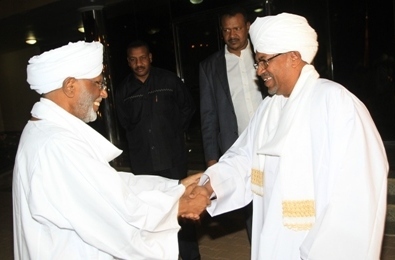Sudan’s national dialogue does not aim to reunite Islamic movement: PCP
March 28, 2014 (KHARTOUM) – Sudan’s opposition Popular Congress Party (PCP) has stressed that the objective of the national dialogue is to achieve democratic transformation and resolve conflicts denying and not to reunite the Islamic Movement (IM).

The opposition umbrella organization known as the National Consensus Forces (NCF) calls for allowing public freedoms, establishing a transitional government, drafting a consensual constitution, and achieving peace in Darfur, South Kordofan, and Blue Nile states.
Rahma said that the Movement of New Democratic Forces (HAQ) agreed in principle to join the dialogue while the Sudanese Communist Party (SCP) expressed certain reservations, but said their position might change.
The PCP official affirmed contacts with Darfuri rebel groups despite the latter’s denial and said the PCP delegates travelled to convince these movements to join the national dialogue.
On Thursday, the PCP said its leading figure, Adam Al-Tahir Hamdoun, was reported to have held a series of meetings in the Kenyan capital of Nairobi with leaders of the Justice and Equality Movement (JEM), Sudan Liberation Movement-Minni Minnawi (SLM-MM), and Sudan Liberation Movement-Abu Al-Gasim Imam (SLM-Imam).
The PCP afterwards said that the rebels agreed to engage in the dialogue with provided the government offered certain guarantees which enables them to be part of the process in the Sudanese capital.
But JEM spokesperson, Gibreel Adam Bilal, denied such meetings. He said the group, together with other rebel groups, has a public position on what is called the National Dialogue and the regime has to fulfil a number of conditions first.
The rebel spokesperson was referring to the rebels’ demand of comprehensive cessation of hostilities and a comprehensive process to be held under the auspice of a joint international mediation.
Rahma said that Hamdoun conveyed the rebels’ demands relating to declaring an immediate ceasefire to the presidency, acknowledging that his party has direct contacts with the ruling party in this regard.
He also revealed existence of open channels of communications with the rebel Sudanese People’s Liberation Movement-North (SPLM-N), calling on president Omer Hassan Al-Bashir to personally issue guarantees to the rebel groups.
Rahma acknowledged the lack of trust between the government and rebel groups, demanding the ruling party to convey its serious desire for dialogue among all government bodies and instruct the army, security forces, paramilitary forces, and concerned bodies to maintain public order and freedoms.
In a televised address to the nation late last January, the Sudanese president announced a four-point plan for reform “to stop the war and bring peace, free political society, fight against poverty and revitalise national identity”.
He further called for political forces and even rebel groups should they lay down arms to engage in dialogue to agree on the implementation items to achieve these objectives.
Bashir afterwards met with several opposition leaders, but it is not yet clear how the dialogue call will be implemented amid deep scepticism over the willingness of the ruling National Congress Party (NCP) to implement deep reforms.
So far NCP officials, including Bashir, have brushed aside opposition calls for the 2015 elections to be delayed and the formation of a transitional government that would work on drafting a new constitution to prepare the country for the polls.
The opposition National Umma Party (NUP) and the PCP are the only major opposition parties who have so far accepted Bashir’s call for national dialogue.
But both parties warned that they would pull out of dialogue with the NCP if no progress is made.
The chairman of the opposition Sudanese Congress Party (SCP), Ibrahim Al-Sheikh, for his part, said that the NUP leader Al-Sadiq Al-Mahdi told the NCF that the goal of the ruling National Congress Party (NCP) behind its call for dialogue is to reach a deal with the PCP, the NUP, and the Democratic Unionist Party (DUP) led my Mohamed Osman Al-Mirghani.
Al-Sheikh, who spoke in the same talk show, said that Al-Mahdi told them in a meeting held five days ago the regime doesn’t intend to engage other opposition parties in the national dialogue process.
He asserted they don’t oppose dialogue but insist on certain conditions including allowing freedoms, releasing political detainees, and ending civil wars, disclosing that four members of his party are currently detained by security apparatus.
“We won’t join the dialogue process unless the government meets our conditions. We will continue to fight until the last moment, even if we remain alone in the opposition,” he added.
(ST)
